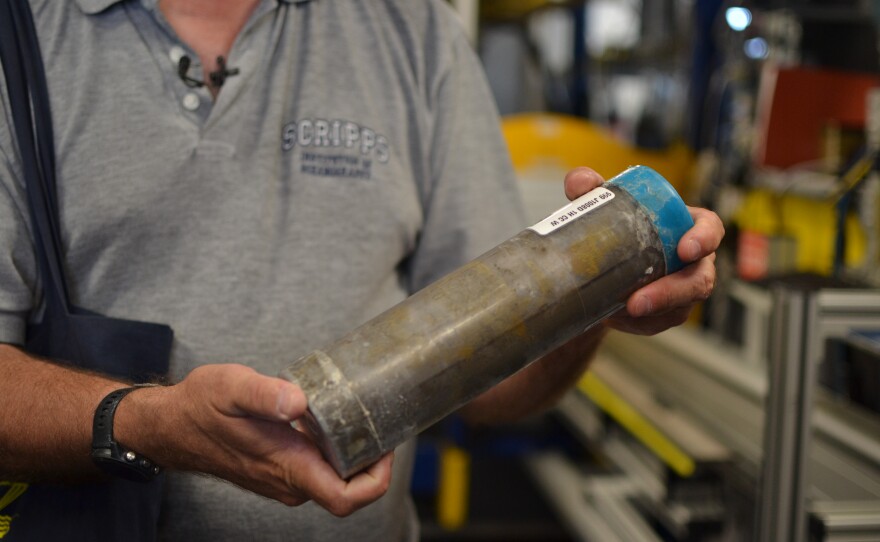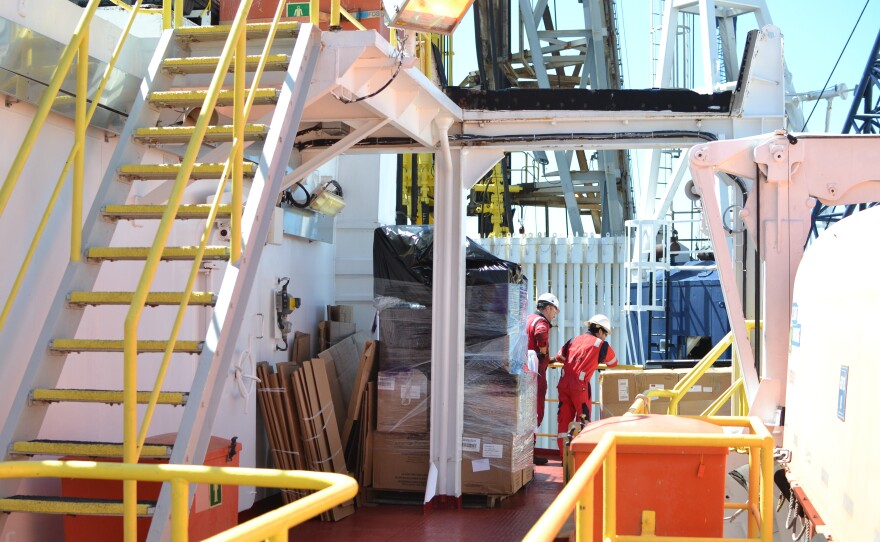The JOIDES Resolution scientific research vessel has docked in the United States for the first time in a decade, after sailing around the world.
It's tied up at the Embarcadero in downtown San Diego, where the crew is loading it up with food and supplies ahead of a major scientific expedition to the Guaymas Basin in the Gulf of California.

Digging for geological data gold
A researcher explains the ship's crew is able to drill for soil samples while at sea.
“This comes out, this guy goes in, like that," said paleontologist Richard Norris of the Scripps Institution of Oceanography, as he puts a plastic tube into a cylindrical drill bit.
Norris is no stranger to the JOIDES Resolution. He’s been on six expeditions.
The ship uses a drill to bore hundreds of meters, sometimes deeper, into the earth’s crust. Some bits are more heavy-duty than others, depending on the difficulty of the terrain at the seafloor.
And in that process, sediment, containing geological materials from perhaps tens of millions of years ago, are being squeezed into a plastic tube.
Why is all this deep ocean dirt-digging happening?

"There’s two things. There’s discovery and then there’s also potential benefits to people," Norris said.
He says there's life deep within the Earth’s crust, or microorganisms, that scientists don’t know much about. Accessing and studying them could help humanity learn what it takes to live in extreme conditions.
"On the discovery side, we really don’t know what the limits of life are. How deep can it go, how hot can it go, how acidic can it be. What are the conditions in which life finally gives up and says we’re done," Norris said.

Life on the boat
The ship has collected samples from over a hundred sites around the world from off the coast of Japan to the Gulf of Cadiz by Portugal. It's been doing that as part of the International Ocean Discovery Program since 2004.
JOIDES researchers say around half of the expeditions on this vessel are intended to help scientists understand the way the earth’s climate has changed over time.
For example, unopened tubes of sediment still on the ship that were collected off the coast of Chile could help scientists understand glacial activity perhaps more than 100,000 years ago.
Norris points to a fossil he's been carrying around on the ship tour.
"This is from Madagascar. But we have found ammonites like this one in cores on expeditions I’ve been on," he said.

Ammonites are fossils of sea creatures, which look like large snails, that lived tens of millions of years ago.
Expeditions are usually 2 months long, and when scientists aren’t busy scrutinizing the mud, they are taking a break from their 12-hour shifts to have a snack or catch up on sleep.
Scientific activity is happening 24 hours a day, seven days a week on this ship. That's because the crew is trying to maximize its efforts, Norris said.
Also, he said, one day of using this ship could run around $100,000. He mentions that he had to secure a $6 million grant for one of his research projects.
"After your shift is over you have a couple hours before you have to go to bed," Norris said.
There's a gym in the hull and a movie theater. Sometimes the crew socializes with dances or by sitting outside and observing the ocean life come to the surface. But, it's all worth it, he said, because many scientists wait a "lifetime" to get on the JOIDES.

Onward to Guaymas
While it's docked in San Diego, the crew is preparing for an expedition to the Gulf of California.
"The seafloor is being created in the Guaymas Basin. It’s very hot, there’s lava erupting into sediments. There's black smokers down there, these vents spewing out all sorts of chemicals as well as life," Norris said.
"It's really a whole different world, that we have very little experience with. I think it's like going to Mars, but it's here on our planet," he said.
It's the second time this vessel will be going to this basin in 40 years. Norris said it's an opportunity for researchers to see what extent life can survive in extreme conditions.
"We keep on discovering that life hangs on in really terrible conditions," Norris said.
The JOIDES resolution vessel plans to leave port this weekend.






